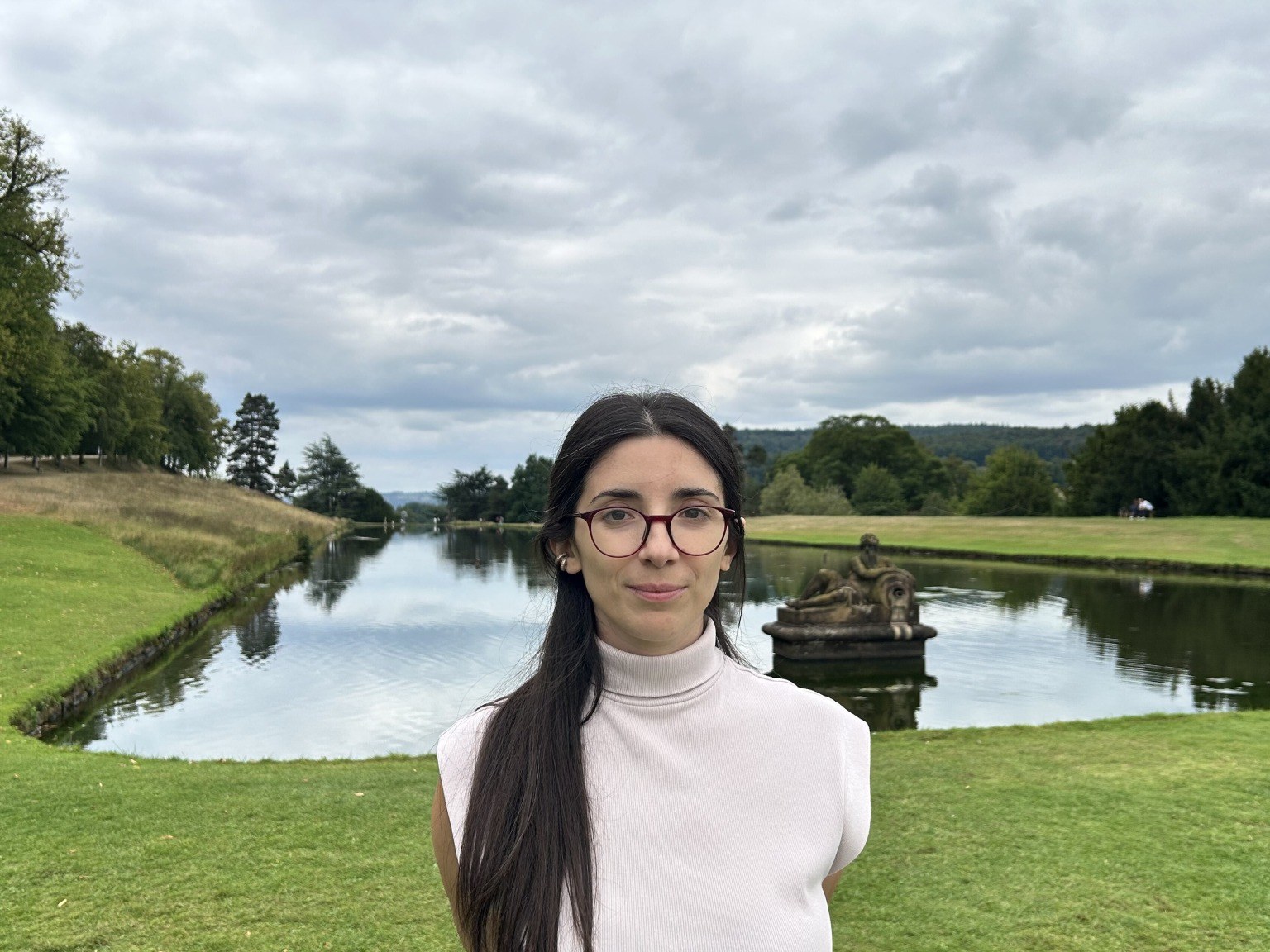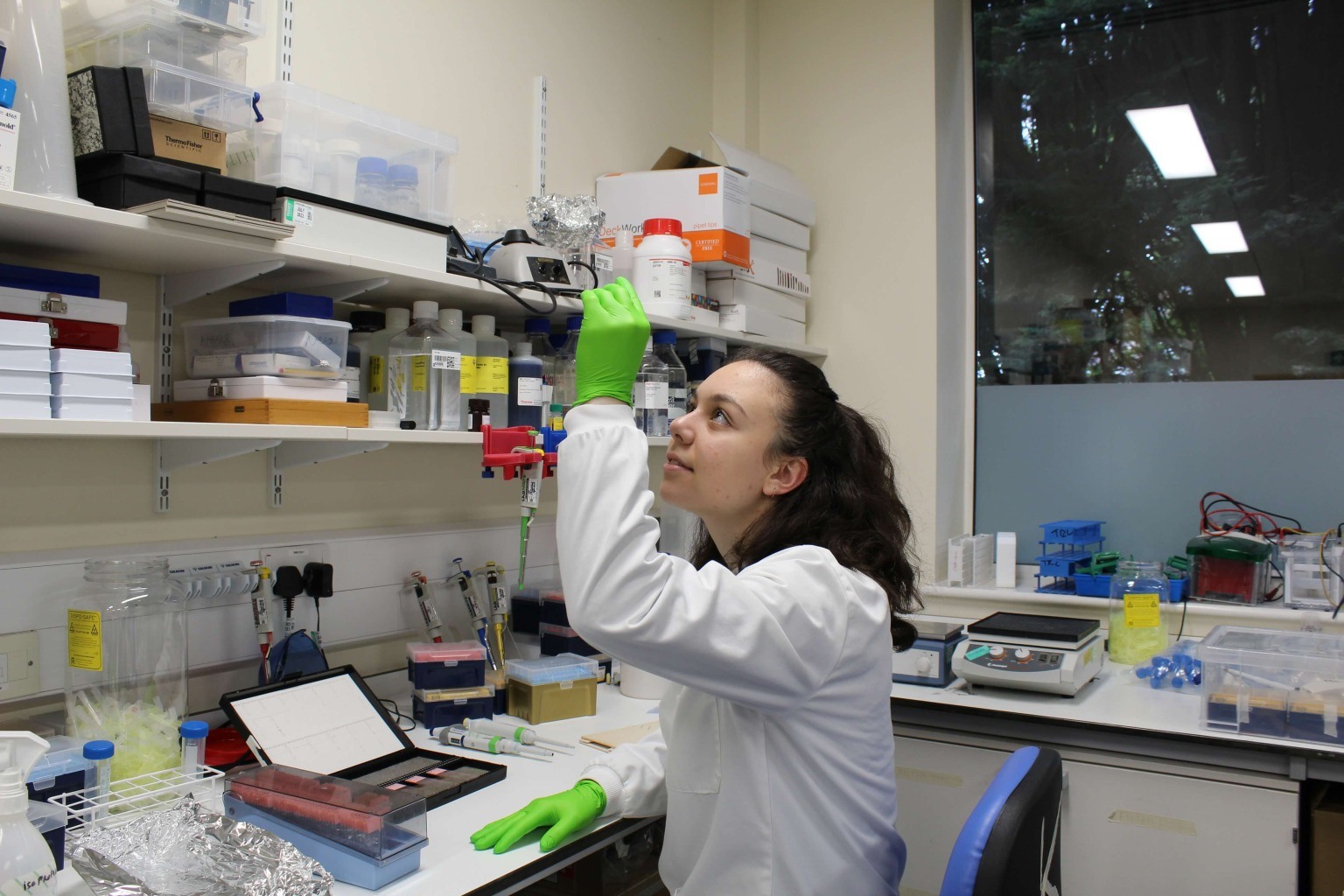
Exploring the invisible: Dr. Ariadni Boziki simulates the molecular world
Chrysovalantou Kalaitzidou

Magazine / Interviews , Science
She got her bachelor’s degree in Molecular Biology and Genetics from Democritus University of Thrace and her MSc focusing on human genetics from Leeds University. She worked on breast cancer stem cells and their drug resistance during her PhD and post-doc at Newcastle University. She then transitioned to Immunocore, a biotechnology company where she worked on creating first-in-class biological therapies in oncology as well as infectious and autoimmune diseases. In June 2020 she decided to pivot her career and join the editorial world of science through the Nature publishing group as an Associate Editor. Paraskevi talked to Greek Women in STEM about her experience both in academia, industry, and the publishing work stage giving us a peek through a very interesting work path in the STEM sectors.
Can you briefly explain what your job entails?
My job as an Associate Editor at Nature Communications mainly entails overseeing all the stages of publishing a manuscript from the initial assessment, finding the appropriate reviewers, making decisions based on the reviewers’ reports, and suggesting necessary edits before publication. I am also responsible for responding to inquiries from authors and reviewers regarding the publication process and attending conferences to keep up to date with the most recent research advances and to interact with researchers.
What was it that initially drew you to Molecular Biology?

I was first fascinated by the field of Molecular Biology when I was studying for the Biology course in high school. The idea of knowing what happens inside the cells really inspired me to understand and learn more about the molecular events underlying normal function and disease. Identifying potential therapeutic targets to enable the development of more efficient treatment strategies seemed like a very meaningful and at the same time powerful task.
Why did you decide to conduct your PhD in oncology/cancer biology?
Cancer remains one of the most challenging and hard-to-treat diseases and what makes it more challenging is that it’s not a single disease. For instance, breast cancer, which I studied for my PhD, can be divided into more than 10 molecular subtypes. I found this very intriguing from a scientific perspective and I was particularly interested in the concept of cancer stem cells and their involvement in metastasis and drug resistance. Hoping that my work could perhaps add a piece to the puzzle of what we already know was the driving force leading me to work in this field.
What does genomics and more specifically cancer epigenomics mean?
Genomics involves the study of whole genomes of organisms and incorporates elements from genetics. It uses a combination of recombinant DNA, DNA sequencing methods and bioinformatics to sequence, assemble, and analyse the structure and function of genomes. The term epigenome has the Greek word epi as a prefix and it literally means 'above the genome'. The epigenome consists of chemical compounds that regulate the genome by either modifying it or by marking it leading to the regulation of gene expression (activation or inactivation). Epigenomics involves the study of these processes.
I felt that I was missing the basic research element, but at the same time, I wanted to move out of the bench. Working as an editor seemed suitable for me, considering that I like reading and writing about science. I also liked the idea of having the "privilege" of seeing science before it gets published.
Taking into consideration that you have been a post-doctoral researcher at a university and in industry what would you say are the basic differences in a researcher’s everyday life but also in the way research is conducted?
Working as a postdoctoral scientist in academia gives you the freedom of being able to work on your own research concepts and to design your own projects. However, most positions come with short contracts, which makes it difficult for the researcher to plan their work and make long-term plans for their projects. In addition, there is always the concern of trying to get your work published in time, so that you can secure your next funding, but it is often more complex than this. Industry removes the stress of having to secure funding and it offers more stability. Nevertheless, basic research is usually not the first priority of companies and such opportunities are limited. Most efforts are focused on developing robust pipelines and increasing throughput and not necessarily on understanding biological processes.
What made you decide to exchange first-line research with a position as an Associate Editor in Nature Communications and how easy was it for you to take that step?
I felt that I was missing the basic research element, but at the same time, I wanted to move out of the bench. Working as an editor seemed suitable for me, considering that I like reading and writing about science. I also liked the idea of having the "privilege" of seeing science before it gets published and getting to meet and interact with researchers working on several different areas. I have always liked the scientific publishing field, as I had served as a reviewer during my academic career. I guess then it was all about finding the right opportunity. The position of the Associate Editor at Nature Communications was very relevant to my research experience, as I currently handle papers on cancer genomics (including single cell genomics), epigenomics, and papers aiming to characterise the tumour microenvironment with implications for the development of cancer immunotherapies. I would say that perhaps the most challenging part of getting this position was the interview process that consisted of several stages and required the completion of several tasks, but it was well-organised and it went smoothly.
What would you say is the most interesting part of your job today?
The most interesting part for me is the interaction with all these researchers and being able to help them with improving their work and getting it published. Being able to use my knowledge and contribute to science this way is very engaging and rewarding. I also enjoy learning new things and having a variety of tasks to work on every day. There are many communities within the publishing group that you can be part of and share knowledge with other editors, which I find very supportive.
Is your job environment mainly male-dominated and how do you feel about that?
In life sciences, women and men complete similar amounts of higher education degrees and women in this sector exhibit higher participation than in any other STEM area. However, it seems that women are still underrepresented in the scientific publishing sector, especially in more senior positions. This could be due to a number of reasons including stereotypes regarding women’s skills and deeper parenting responsibilities. I am aware that several publishing groups are taking proactive measures to promote gender equality and to decrease gender bias and I am hopeful that this will lead to gender-balanced scientific communities.
What skills do you think someone must have to get such a job? What would be your advice to a young woman who wants to pursue such a career?
Besides having a strong academic background, one needs to have good organisational and prioritisation skills and to be flexible. Good communication skills, both written and verbal are also essential. As we largely interact with the wider scientific community, I would say that good interpersonal skills are important too. My advice for young female researchers that are interested in an editorial career, would be to try to develop the above mentioned skills and to work towards building a scientific network. There are many opportunities, but persistence is always the key to securing the most suitable opportunity for them.
Follow Paraskevi on Linkedin.

Chrysovalantou Kalaitzidou

Thaleia-Dimitra Doudali

Danai Korre
